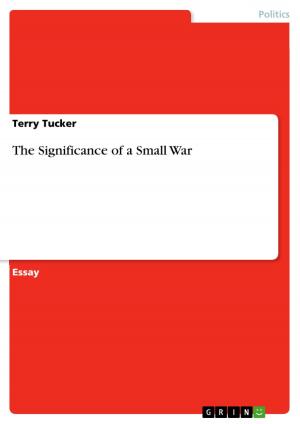Philip Roth - How to Deal with Postmodern Reality, or, Changes in Fiction Writing.
How to Deal with Postmodern Reality, or, Changes in Fiction Writing.
Nonfiction, Entertainment, Drama, Anthologies| Author: | Michael Obenaus | ISBN: | 9783638266338 |
| Publisher: | GRIN Publishing | Publication: | April 8, 2004 |
| Imprint: | GRIN Publishing | Language: | English |
| Author: | Michael Obenaus |
| ISBN: | 9783638266338 |
| Publisher: | GRIN Publishing |
| Publication: | April 8, 2004 |
| Imprint: | GRIN Publishing |
| Language: | English |
Seminar paper from the year 1998 in the subject American Studies - Literature, grade: 1,3 (A), Humboldt-University of Berlin (Institute for Anglistics/ American Studies), course: American Postmodernism, language: English, abstract: 'By now you are a walking text' (FACTS, 162), Zuckerman writes back to Philip Roth, having been asked whether or not Roth should publish his autobiography The Facts (1988). Zuckerman is one of the characters from Roth's books, the hero of the trilogy Zuckerman Bound (1985) and some short stories. He is a fictional character whom Roth addresses in the prologue to The Facts, asking for advice concerning the publication of what Roth calls the result of '...writing a book absolutely backward, taking what I have already imagined and, as it were, desiccating it, so as to restore my experience to the original, prefictionalized factuality.' (FACTS, 3) Reading Philip Roth in a context of postmodern literature in America I have come to wonder what it actually is he himself is trying to do with his writing. Comparing Roth's early narratives to more recent works I am tempted to say that a development can be observed towards an incorporation of narrative features which can be described as 'postmodern', i.e. that there are strong influences of a 'postmodern reality' in the work of Philip Roth, although he himself can probably not be called a postmodern writer in the strict meaning of the term. Here, of course, already appears a major problem for my assumption: What is 'postmodern writing' at all? Are there common features shared by (all) the representatives of postmodernism which could justify the application of such a classification? And if so, what precisely are these features and how can they be described?
Seminar paper from the year 1998 in the subject American Studies - Literature, grade: 1,3 (A), Humboldt-University of Berlin (Institute for Anglistics/ American Studies), course: American Postmodernism, language: English, abstract: 'By now you are a walking text' (FACTS, 162), Zuckerman writes back to Philip Roth, having been asked whether or not Roth should publish his autobiography The Facts (1988). Zuckerman is one of the characters from Roth's books, the hero of the trilogy Zuckerman Bound (1985) and some short stories. He is a fictional character whom Roth addresses in the prologue to The Facts, asking for advice concerning the publication of what Roth calls the result of '...writing a book absolutely backward, taking what I have already imagined and, as it were, desiccating it, so as to restore my experience to the original, prefictionalized factuality.' (FACTS, 3) Reading Philip Roth in a context of postmodern literature in America I have come to wonder what it actually is he himself is trying to do with his writing. Comparing Roth's early narratives to more recent works I am tempted to say that a development can be observed towards an incorporation of narrative features which can be described as 'postmodern', i.e. that there are strong influences of a 'postmodern reality' in the work of Philip Roth, although he himself can probably not be called a postmodern writer in the strict meaning of the term. Here, of course, already appears a major problem for my assumption: What is 'postmodern writing' at all? Are there common features shared by (all) the representatives of postmodernism which could justify the application of such a classification? And if so, what precisely are these features and how can they be described?















